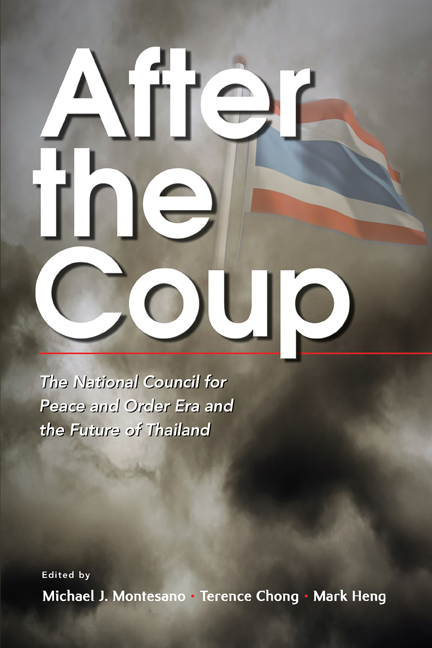Book contents
- Frontmatter
- Contents
- About the Contributors
- 1 Introduction: Thai Realities and Possibilities after the 22 May Coup
- 2 The Rise of the Thai Upper Middle Class and its Turn against Democracy
- 3 “We the Southerners Come to Protect the Nation and the King”: Southerners’ Political Rise and Regional Nationalism in Thailand
- 4 Exit, Voice, (Dis)loyalty? Northeast Thailand after the 2014 Coup
- 5 The Red Shirts and their Democratic Struggle in Northern Thailand, April 2010 – May 2015
- 6 The Shifting Battleground: Peace Dialogue in Thailand's Malay-Muslim South
- 7 Thailand's Zigzag Road to Democracy: Continuity and Change in Military Intervention
- 8 Murder and Regress: Violence and Political Change in Thailand
- 9 Thailand's Politics of Decentralization: Reform and Resistance before and after the May 2014 Coup
- 10 Change and Continuity in the Politics of the Media after the Coup
- 11 Thailand's Royal Democracy in Crisis
- 12 The Foreign Press and its Changing Perceptions of the Thai Monarchy
- 13 Thai Economic Growth: Retrospect and Prospect
- 14 Features and Challenges of an Ageing Population in Thailand
- 15 Conclusion: Thailand in Transition
- Bibliography
- Index
7 - Thailand's Zigzag Road to Democracy: Continuity and Change in Military Intervention
Published online by Cambridge University Press: 23 May 2019
- Frontmatter
- Contents
- About the Contributors
- 1 Introduction: Thai Realities and Possibilities after the 22 May Coup
- 2 The Rise of the Thai Upper Middle Class and its Turn against Democracy
- 3 “We the Southerners Come to Protect the Nation and the King”: Southerners’ Political Rise and Regional Nationalism in Thailand
- 4 Exit, Voice, (Dis)loyalty? Northeast Thailand after the 2014 Coup
- 5 The Red Shirts and their Democratic Struggle in Northern Thailand, April 2010 – May 2015
- 6 The Shifting Battleground: Peace Dialogue in Thailand's Malay-Muslim South
- 7 Thailand's Zigzag Road to Democracy: Continuity and Change in Military Intervention
- 8 Murder and Regress: Violence and Political Change in Thailand
- 9 Thailand's Politics of Decentralization: Reform and Resistance before and after the May 2014 Coup
- 10 Change and Continuity in the Politics of the Media after the Coup
- 11 Thailand's Royal Democracy in Crisis
- 12 The Foreign Press and its Changing Perceptions of the Thai Monarchy
- 13 Thai Economic Growth: Retrospect and Prospect
- 14 Features and Challenges of an Ageing Population in Thailand
- 15 Conclusion: Thailand in Transition
- Bibliography
- Index
Summary
Instead of asking why the military engage in politics,
We ought surely ask why they ever do otherwise.
— Samuel E. Finer The Man on Horseback (1962, p. 5)As society changes, so does the role of the military.
In the world of oligarchy, the soldier is a radical;
in the middle-class world, he is a participant and arbiter;
as the mass society looms on the horizon,
he becomes the conservative guardian of the existing order.
— Samuel Huntington Political Order in Changing Societies (1968, p. 221)Will the military launch a coup? Will the army overthrow the elected government? Such questions continue to arise regardless of the stage of development in which Thai society finds itself. From 1932 to the present, military intervention in Thai national politics has been a recurring theme, making it necessary for those who want to understand Thai politics to understand the Thai military. Indeed, the role of the military in the country's politics has been a crucial point of contention since the Siamese Revolution of 1932. It remains so because the Thai officer corps remains unreformed and unchanged. From 1932 to the Second World War, to the Cold War and through the post–Cold War era, the military has remained a main actor in Thai politics regardless of changing international circumstances.
Thai politics remains subject to the significant influence of military leaders. Since its break with the palace in 1932 and through its extended record of political intervention in subsequent decades, the Thai officer corps has held an undisputed role as a leading political actor in the country. The military has never proved its professionalism in large-scale warfare; rather, it has engaged only in limited counter-insurgency operations in rural areas. The absence of external security challenges has left the army free to involve itself in political affairs and to become more skilled in political manipulation. Furthermore, the political strength of the army has owed much to the weakness of civil society and of other potential civilian challengers.
This reality suggests that the political preferences of military elites determine whether a democratic transition is possible or not. More fundamentally, the country cannot sustain such a democratic transition unless military elites decide to commit to democratic rule and to abide by government by elected civilians. In other words, the Thai military's support is a basic prerequisite for the emergence of democratic rule.
- Type
- Chapter
- Information
- After the CoupThe National Council for Peace and Order Era and the Future of Thailand, pp. 170 - 193Publisher: ISEAS–Yusof Ishak InstitutePrint publication year: 2019

